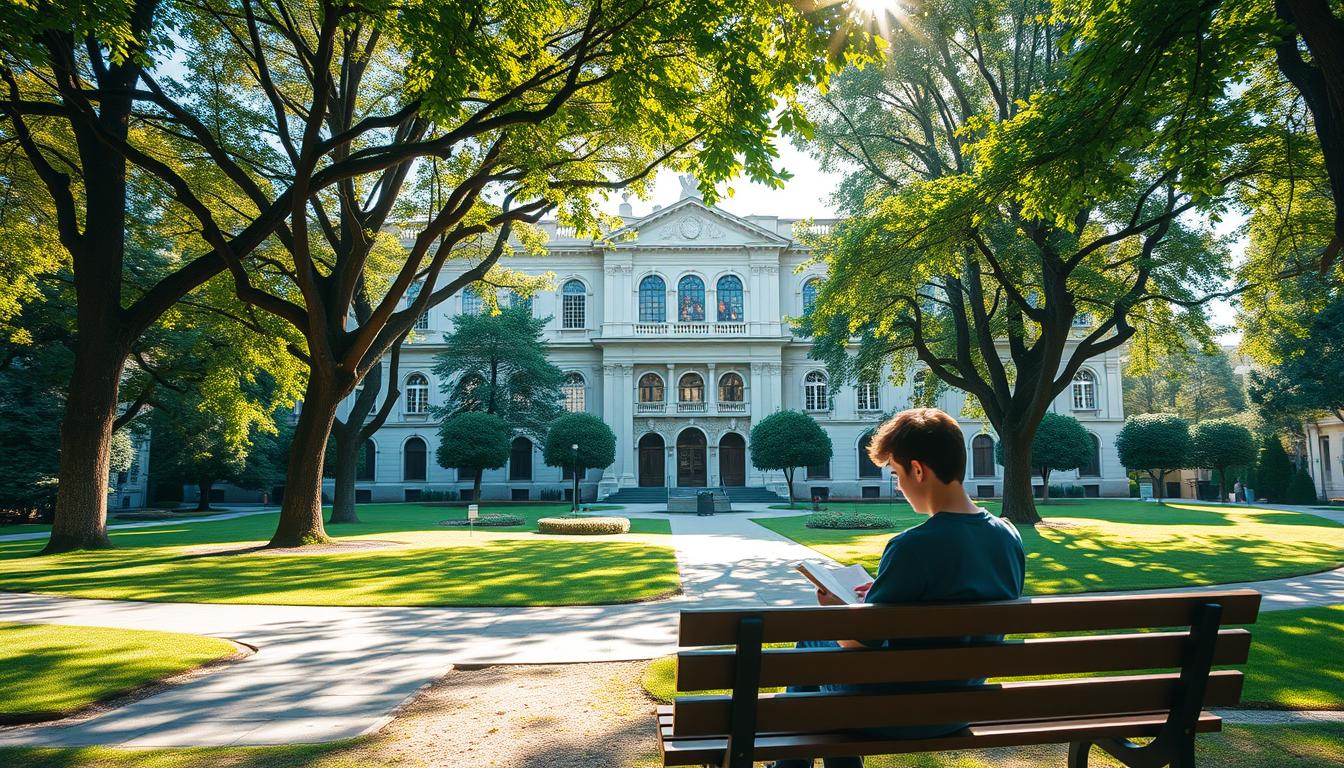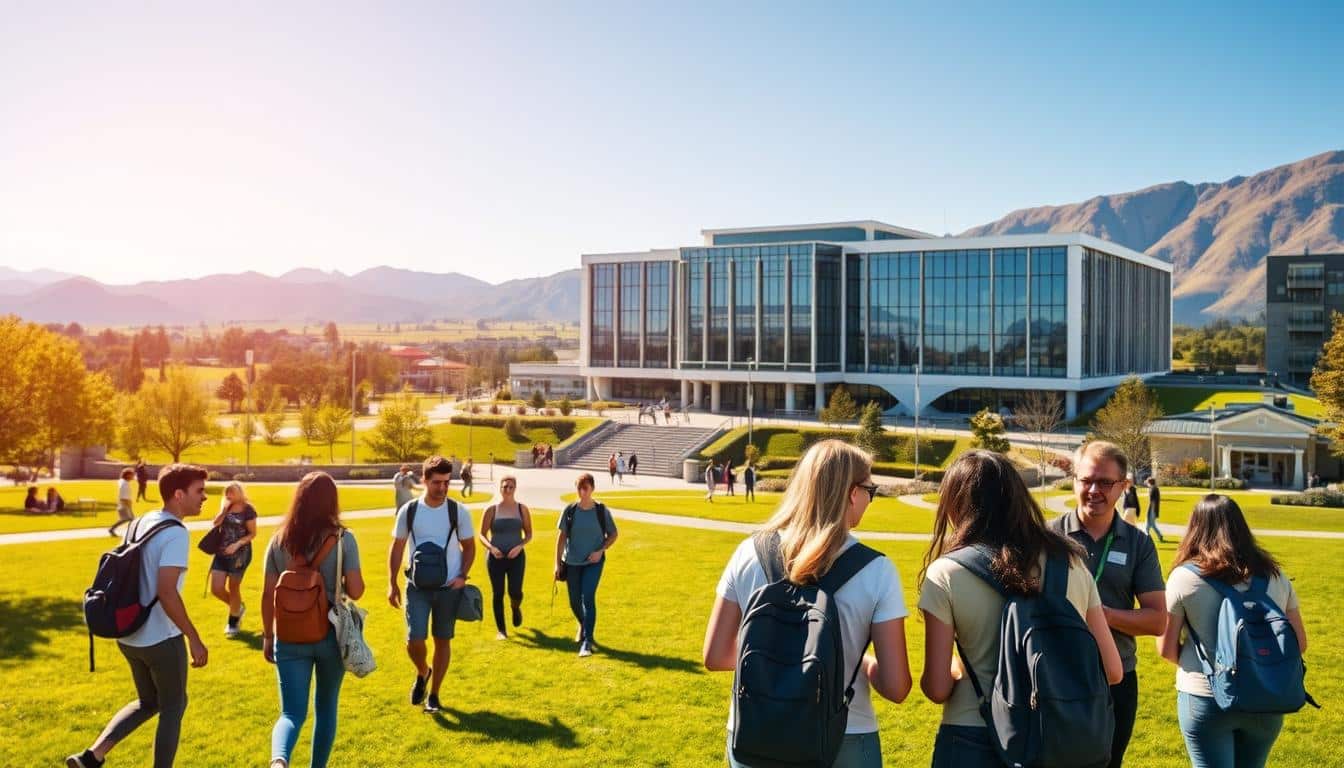Germany is a top choice for students seeking high-quality education without breaking the bank.
Anúncios
Public universities offer nearly tuition-free programs, making it an attractive option for learners worldwide. However, covering living expenses abroad can still be a challenge.
For South African students, financial planning is crucial when considering overseas study. Thankfully, numerous funding opportunities exist, from government-backed programs to university-specific awards. Well-known options like DAAD and Erasmus+ provide support for talented applicants.
Anúncios
This guide covers everything from eligibility criteria to application strategies. It also explains post-award requirements to help students make informed decisions. With the right approach, securing financial assistance for education in Europe becomes an achievable goal.
For more information, explore the official scholarship website mentioned in this article:
You will be redirected to another website
Why Germany Offers Exceptional Scholarship Opportunities
Studying abroad in Europe doesn’t have to drain your savings, thanks to Germany’s accessible education model. Public institutions charge just €300 per semester in administrative fees—a fraction of costs in the UK or France. This makes german universities a magnet for international students seeking quality higher education.
Affordable World-Class Education System
Compared to other Western European nations, Germany’s tuition structure is unmatched. Students spend roughly €934 monthly on living expenses, including:
- Housing: €410
- Food: €200
- Health insurance: €120
Financial aid often covers 50–100% of these costs. Programs like Deutschlandstipendium award €300 monthly, regardless of income.
Diverse Funding Options for International Students
Over 65% of international students receive financial support. The Expatrio Scholarship, for example, offers a €15,000 grand prize for 2025 applicants. Government and private programs ensure no talented learner is left behind.
From partial stipends to full coverage, scholarships germany caters to diverse needs. This commitment to accessibility solidifies its reputation in global higher education.
German Scholarships: Types and Funding Sources
Funding options for studying in Germany come in various forms, catering to different academic needs. Whether through government initiatives, university endowments, or corporate sponsorships, students can find tailored support. Below is a breakdown of the primary sources.
Government-Funded Programs
The German Academic Exchange Service (DAAD) leads with €639 million allocated for 2024. Their programs cover tuition, living costs, and travel. Regional priorities, like Central Asia and Mexico, influence award distribution.
University-Specific Awards
Merit-based grants are offered by 48 institutions. For example, Heidelberg University’s HAUS program rewards academic performance with €850 monthly. These awards often target specific disciplines like engineering or humanities.
Private Organization Sponsorships
Corporate and foundation grants focus on niche fields. The Bayer Foundation provides €10,000 for STEM research, while Konrad-Adenauer-Stiftung supports PhD candidates with €1,400/month. Demographics like gender or nationality may also factor in.
| Funding Type | Coverage | Example |
|---|---|---|
| Government | Full tuition + stipend | DAAD Scholarships |
| University | Partial to full stipends | TU Munich Merit Awards |
| Private | Research/field-specific grants | Linde Tech Scholarships (€1,000/month) |
Each option has unique benefits, from DAAD’s comprehensive packages to private grants’ specialized focus. Researching eligibility early maximizes success.
Top Government-Funded Scholarship Programs
Government-backed financial aid makes studying abroad more accessible for international learners. These programs reduce financial stress, allowing students to focus on academic success. Three standout options offer monthly stipends, travel grants, and comprehensive support.
DAAD Scholarship Programs
The DAAD scholarships rank among the most competitive awards. Master’s candidates receive €992 per month, while PhD scholars earn €1,300. Selection involves three stages:
- Initial application review (March/July deadlines)
- Committee evaluation (November for final decisions)
- Interviews for shortlisted candidates
Only 12% of applicants secure funding annually. Strong academic records and research proposals boost chances.
Deutschlandstipendium National Scholarship
This merit-based program awards €300 per month for at least two semesters. Unlike need-based aid, it rewards excellence regardless of income. Applicants must:
- Apply separately to their university and the scholarship portal
- Meet GPA thresholds (varies by institution)
- Submit proof of extracurricular achievements
Erasmus+ Programs for South Africans
Erasmus+ supports studies germany with €850–1,000 monthly plus travel grants. South African institutions like UCT and Wits have direct partnerships. Key 2025 deadlines fall between May and November.
The selection criteria emphasize academic alignment and cross-cultural engagement. Awardees often join exchange programs with EU universities.
Prestigious Foundation Scholarships
Private foundations provide specialized funding for students with strong academic performance and social engagement. These awards often align with specific ideologies, offering tailored support beyond generic financial aid.
Heinrich Böll Foundation Awards
This foundation prioritizes environmentalism and human rights. Monthly stipends range from €812 to €1,450, depending on the applicant’s country of origin. Key 2025 deadlines are March 1 and September 1.
Non-EU students receive higher funding to offset living costs. The selection committee evaluates:
- Academic records (minimum 2.0 GPA equivalent)
- Environmental activism or research
- Interview performance (20-minute policy discussion)
Friedrich Ebert Foundation Funding
Focused on social democracy, this program requires alignment with its values. PhD candidates earn €1,400 monthly. Applications are reviewed year-round.
Unique requirements include:
- Essay on social justice initiatives
- Proof of volunteer work (minimum 50 hours)
- B1 German proficiency for non-EU applicants
Konrad-Adenauer-Stiftung Opportunities
This conservative-leaning foundation mandates B2 German proficiency and a four-semester commitment. Stipends are tiered by level of study:
| Study Level | Monthly Stipend (€) |
|---|---|
| Undergraduate | 850 |
| Graduate | 1,200 |
| PhD | 1,500 |
Shortlisted applicants attend interviews with academic and political panels. Volunteer experience strengthens candidacy.
University-Specific Financial Aid Options
Leading institutions in Germany provide tailored financial support to help students achieve academic success. These programs often target specific fields or demographics, complementing broader funding schemes. Below are three standout options from top german universities.
Technical University of Munich Scholarships
TUM’s Linde Scholarship awards €1,000 monthly to data science master’s students. Women in STEM fields receive priority during selection. Key criteria include:
- Minimum 1.5 GPA (German scale equivalent)
- Admission to a TUM degree program
- Application deadlines: March 15 and October 15
Heidelberg University HAUS Program
HAUS offers $7,000 per semester for U.S. students, but excludes dual funding recipients. Applicants must:
- Maintain full-time enrollment
- Submit proof of academic excellence (top 10% of class)
- Apply by June 8 for 2025 consideration
University of Hamburg Merit Awards
International undergraduates can earn €930 monthly after completing two semesters. Eligibility hinges on:
- 2.0 GPA or higher
- Active participation in campus initiatives
- Submission of a 500-word research proposal
These universities demonstrate Germany’s commitment to accessible study opportunities. Early preparation ensures applicants meet strict deadlines and criteria.
Research-Focused Funding Opportunities
For students pursuing advanced research, specialized funding options can turn academic goals into reality. These programs support groundbreaking projects across disciplines, from biotechnology to social sciences. Below are three standout opportunities for ambitious researchers.
Humboldt Research Fellowships
The Humboldt Foundation offers tiered stipends for postdoctoral and experienced researchers. Monthly funding ranges from €2,700 to €3,200, with additional allowances for family members. Applicants fall into two categories:
- Postdocs: Up to 4 years after PhD, requiring peer-reviewed publications.
- Experienced researchers: 4–12 years post-PhD, with leadership in their field.
“Humboldt fellows gain not just funding, but lifelong access to a global academic network.”
Applications undergo rolling reviews, with no fixed deadlines. South African researchers have a 22% success rate in 2024.
Marie Skłodowska-Curie Actions (MSCA)
MSCA grants fund collaborative research across European institutions. Annual budgets range from €4,880 to €6,760, covering lab costs and conferences. Proposals are scored on:
- Excellence (50% weight): Innovation and methodology.
- Impact (30%): Societal or scientific contributions.
- Implementation (20%): Feasibility and team expertise.
South African participants in Horizon Europe projects rose by 18% last year.
Bayer Foundation STEM Grants
Bayer funds six-month lab placements with €10,000 grants. Three streams target specific fields:
| Stream | Focus Area |
|---|---|
| Medical Sciences | Oncology, cardiology |
| Agricultural Sciences | Sustainable farming |
| Data Science | AI-driven diagnostics |
The 2025 deadline is April 11. Successful applicants receive mentorship from Bayer’s R&D teams.
Eligibility Requirements for South African Applicants
South African students aiming for overseas education must meet specific academic and language benchmarks. These requirements ensure candidates are prepared for rigorous programs. Funding bodies assess applications based on grades, language skills, and country-specific rules.
Academic Performance Thresholds
Most programs demand a minimum 75% average for consideration. Competitive awards like DAAD often require 80% or higher. South African marks must be converted to the German grading scale using official tools.
Key grade conversions include:
- 80–100% = 1.0–1.5 (German scale)
- 70–79% = 2.0–2.5
- 60–69% = 3.0–3.5
Language Proficiency Expectations
German-taught programs need TestDaF 4 or DSH 2 scores. English options accept IELTS 6.5 or TOEFL 90. Below are accepted tests:
| Test | Minimum Score |
|---|---|
| IELTS | 6.5 |
| TOEFL iBT | 90 |
| Telc Deutsch C1 | Pass |
Country-Specific Criteria
South Africans must submit SAQA-evaluated qualifications for non-EU recognition. Undergraduate applicants need an APS certificate. Some programs, like Erasmus Mundus, allocate slots by country.
Additional opportunities include:
- NRF co-funding for bilateral agreements
- Priority for STEM fields in certain awards
- Proof of extracurricular leadership
Essential Application Documents Checklist
Missing documents are the top reason for rejection in scholarship applications, making organization crucial. South African applicants should begin gathering materials at least three months before deadlines. Proper preparation demonstrates professionalism and increases selection chances.
Academic Transcripts and Certificates
All programs require certified academic records. The SAQA evaluation takes 6-8 weeks and must include:
- Notarized English translations (for DAAD applications)
- APS certificate for undergraduate studies
- Course-by-course descriptions for credit transfers
During COVID-19, some institutions accept uncertified copies initially but require originals upon arrival. Always verify current policies.
Motivation Letter Components
A compelling letter follows this structure:
- Background: Relevant experiences (300 words max)
- Goals: Academic and career objectives
- Fit: Why this specific program aligns with aspirations
- Impact: How the award will create change
“DAAD emphasizes concise, prompt-specific responses—general templates lead to immediate rejection.”
Recommendation Letter Guidelines
Referees must follow strict protocols:
| Requirement | Details |
|---|---|
| Contact Information | Institutional email addresses only |
| Format | DAAD template for government awards |
| Content | Specific examples of academic performance |
Arts applicants should prepare supplemental portfolios. Include 10-15 digital samples with descriptions of creative process and influences. Video submissions shouldn’t exceed 5 minutes.
Remember that complete documentation showcases an applicant’s attention to detail—a key selection factor for competitive awards. Double-check each program’s unique requirements before submission.
Crafting a Winning Scholarship Proposal
A well-structured proposal can make or break a funding application. Top programs like Humboldt and MSCA evaluate hundreds of submissions annually. Standing out requires clear alignment with institutional priorities and demonstrable impact.
Research Project Structuring
Humboldt mandates 10-page proposals with specific sections:
- Gantt charts showing project timelines
- Budget breakdowns with justification
- Risk assessment matrices
MSCA allocates 70% of scoring to interdisciplinary approaches. Successful applicants connect their field to at least two other disciplines.
Academic Relevance Demonstration
Germany prioritizes research in these areas:
| Priority Sector | Example Projects |
|---|---|
| Energy Transition | Battery storage solutions |
| AI Ethics | Algorithmic bias mitigation |
| Bioengineering | CRISPR applications |
DAAD favors proposals addressing UN Sustainable Development Goals. Climate action and quality education projects receive 32% more funding.
Methodology Presentation Tips
STEM applicants should include visual abstracts. These single-page summaries help non-specialists grasp complex projects. Key elements:
- Problem statement (1-2 sentences)
- Innovation differentiation
- Experimental design flowchart
“Reviewers spend 4-7 minutes per proposal initially. Concise methodology sections with bullet points perform best.”
Humanities study proposals require ethical review documentation. Animal research needs approval from German oversight boards.
Understanding the Selection Process
Securing financial support for international education involves navigating competitive evaluation systems. Each program follows unique criteria, requiring tailored preparation from applicants. This section breaks down key components to help candidates anticipate what reviewers prioritize.
Evaluation Criteria Breakdown
Most funding bodies use weighted scoring systems. DAAD allocates points across three areas:
- 40% for academic records and test scores
- 30% for research proposal quality
- 30% for personal statements and interviews
Private foundations often emphasize different factors:
| Organization | Top Evaluation Factor | Weight |
|---|---|---|
| Heinrich Böll | Environmental activism | 45% |
| Friedrich Ebert | Social justice involvement | 50% |
| Konrad-Adenauer | Political alignment | 40% |
Interview Preparation Strategies
Successful candidates approach interviews systematically. The STAR method (Situation, Task, Action, Result) works well for competency questions. Researching committee members’ publications provides talking points.
Cultural awareness matters in German academic settings:
- Arrive 10 minutes early for virtual interviews
- Maintain direct eye contact
- Prepare concise, evidence-based responses
“Mock interviews with alumni improve performance by 62% compared to solo preparation.”
Timeline Expectations
The selection process typically spans 5-8 months. Key phases include:
- Initial screening (2-4 weeks post-deadline)
- Committee review (8-12 weeks)
- Final decisions (4-6 weeks)
DAAD portal updates show real-time application status. Early submissions don’t guarantee faster responses but demonstrate professionalism. Some foundations notify shortlisted candidates within 3 months.
Understanding these criteria and timelines helps applicants manage expectations. Preparation matched to the program’s level of competitiveness significantly improves success rates.
Financial Benefits and Coverage Details
Comprehensive funding packages often include more than just tuition coverage. Successful applicants receive various forms of support to make their academic journey manageable. These benefits help offset living costs and other expenses associated with overseas study.
Monthly Support Amounts
Stipend values vary significantly between programs. DAAD offers €992 per month for master’s students, while PhD candidates receive €1,300. Other programs provide tiered support:
- Deutschlandstipendium: €300 per month
- Erasmus+: €850-1,000 monthly
- University awards: €700-1,200 depending on institution
Tax implications apply for amounts exceeding €11,880 annually. Some awards include semester tickets for local transport.
Health Insurance Provisions
All international students must have health coverage. Public insurance costs about €120 monthly, while private plans range from €80-200. Key differences:
| Coverage Type | Benefits | Requirements |
|---|---|---|
| Public | Full coverage including dental | Mandatory for students under 30 |
| Private | Lower premiums | Proof of comparable coverage |
DAAD provides €120 insurance subsidies for recipients. Some university grants include partial reimbursement.
Additional Allowances
Many programs offer extra support for specific needs:
- Family benefits: €276/month for spouses, €237 per child
- Green travel bonus: €53 for eco-friendly transportation
- Childcare support: HAW Hamburg provides €155 monthly Kinderzuschlag
“Visa fee reimbursements are available through some foundation awards – always check program specifics.”
These financial benefits make pursuing education abroad more accessible. Understanding the full package helps students budget effectively throughout their program.
Key Deadlines for 2025 Applications
Strategic planning around application windows separates successful candidates from missed opportunities. South African students often juggle multiple submissions across different funding sources. Understanding each program’s unique timeline prevents last-minute rushes and incomplete packets.
Winter Semester Priority Dates
Most German universities follow a July 15 cutoff for winter intake. However, funding bodies set earlier deadlines to allow processing time. DAAD typically closes applications by March 1 for master’s programs starting in October.
Early birds gain three advantages:
- Priority document verification
- More interview time slots
- Higher chances for accommodation assistance
Program-Specific Timelines
Major awards follow distinct cycles. The Expatrio Scholarship requires video submissions by September 30. Erasmus+ operates through partner universities, with windows between May and November.
Top programs for South Africans:
| Program | 2025 Deadline | Notification |
|---|---|---|
| DAAD Study Scholarships | August 1 | December |
| Deutschlandstipendium | University-dependent | March/September |
| Heinrich Böll Foundation | March 1/September 1 | June/December |
| Erasmus Mundus | January 31 | April |
| Konrad-Adenauer-Stiftung | July 15 | October |
Document Preparation Timelines
SAQA evaluations take 6-8 weeks during peak periods. Applicants should request transcripts at least three months before submission. Language test results require 2-4 weeks for processing.
“Missing a deadline by even one day automatically disqualifies 92% of applications according to DAAD statistics.”
Portal management tips:
- Create a dedicated email for applications
- Set calendar reminders two weeks before each deadline
- Upload documents as PDFs under 5MB
Post-Award Requirements and Responsibilities
Receiving financial support for education abroad comes with ongoing commitments. Awardees must fulfill specific obligations to maintain their funding and maximize program benefits. Understanding these requirements helps students stay compliant while achieving their academic goals.
Tracking Academic Progress
Most programs require regular performance updates. DAAD mandates biannual reports with supervisor feedback. These documents typically include:
- Course completion certificates
- Research milestone achievements
- Grade transcripts (minimum 80% average)
Some foundations impose additional requirements:
| Organization | Reporting Frequency | Required Documents |
|---|---|---|
| Heinrich Böll | Quarterly | Community service logs |
| Erasmus+ | Semesterly | Language proficiency tests |
Funding Extension Options
High-performing students can often extend their awards. Extension criteria vary by program:
- DAAD: Requires new research proposal and 85% average
- University awards: Department chair recommendation needed
- Private foundations: Additional project deliverables
“Approximately 68% of successful extension applicants submit their requests at least three months before funding expiration.”
Alumni Engagement Expectations
Graduates typically maintain program connections for five years. Common alumni responsibilities include:
- Annual career updates to the funding organization
- Participation in mentorship programs
- Attendance at networking events (minimum one per year)
Alumni benefits often outweigh these requirements:
- Exclusive job postings from partner companies
- Continued access to research databases
- Invitations to specialized workshops
Conclusion: Next Steps for South African Applicants
Navigating financial aid options requires strategic planning and timely execution. International students should start by researching programs that align with their academic goals. Creating a comparison spreadsheet helps track requirements and deadlines.
The DAAD Johannesburg office offers free consultations for applicants from your home country. Consider applying to universities and funding programs simultaneously to maximize opportunities. Language preparation at Goethe-Institut ensures meeting proficiency standards.
Final checklist for success:
- Organize documents in labeled folders (transcripts, letters, proofs)
- Schedule reminders for german academic program deadlines
- Prepare backup options if first-choice awards aren’t secured
- Test language skills early if planning to study germany-taught courses
- Network with current international students for insider tips
FAQ
What types of financial aid are available for international students in Germany?
Students can access government-funded programs, university-specific awards, and private sponsorships. Options include DAAD scholarships, Deutschlandstipendium, and foundation grants like those from Heinrich Böll Foundation.
How competitive are research-focused funding opportunities?
Programs like Humboldt Research Fellowships and Marie Skłodowska-Curie Actions have rigorous selection processes. Strong academic records, clear research proposals, and relevant experience improve chances.
What language proficiency is required for most awards?
While some programs accept English, many require German proficiency (usually B2/C1 level). Test scores from TestDaF or DSH exams are commonly requested.
Do these opportunities cover living expenses?
Many provide monthly stipends ranging from €850 to €1,200. Some include health insurance, travel allowances, or family supplements depending on the program.
When should applicants start preparing their materials?
Preparation should begin 6-12 months before deadlines. Winter semester applications typically close between March and July, while summer intake deadlines fall in October-January.
Can current students apply for funding mid-degree?
Yes, several programs support ongoing studies. Requirements often include maintaining excellent grades and submitting progress reports from faculty advisors.
What makes a scholarship proposal stand out?
Winning proposals demonstrate clear academic goals, innovative methodologies, and potential contributions to the field. Alignment with the funder’s priorities significantly boosts success rates.
Are there awards specifically for South African nationals?
Yes, programs like Erasmus+ offer country-specific opportunities. Some foundations also prioritize applicants from developing nations, including South Africa.
How do university-specific awards differ from national programs?
Institutional awards often have narrower eligibility criteria tied to particular departments or research areas. They may offer smaller amounts but with higher acceptance rates for qualified candidates.
What post-award obligations should recipients expect?
Most require regular academic reports and may involve networking events. Some programs expect recipients to participate in alumni activities after completing their studies.






